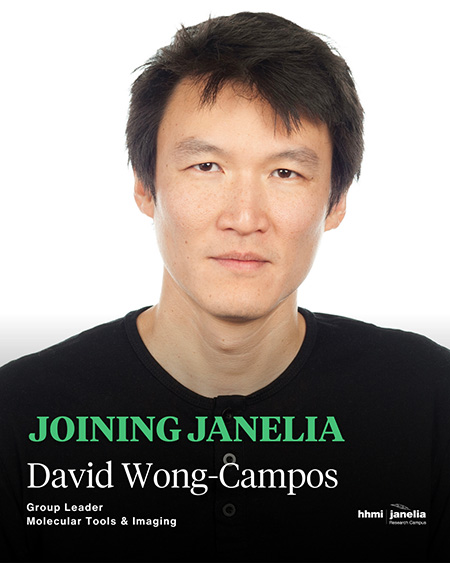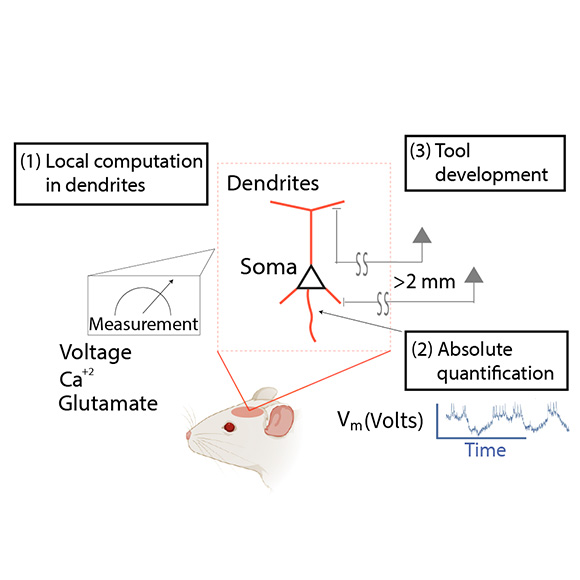David Wong-Campos doesn't consider himself a physicist or a biologist, despite earning a PhD in quantum physics and completing a postdoc building tools for neurobiology. Instead, Wong-Campos says he is driven by the thrill of discovery and a desire for his work to be useful, using whatever discipline is necessary to solve the problem at hand – even if that means coming at a question in an unconventional way. Now a group leader in Janelia's Molecular Tools and Imaging research area, Wong-Campos is employing his non-traditional background and approach to understanding the building blocks of information processing in the brain.

HHMI Janelia: To start, tell us a little bit about your research.
David Wong-Campos: One of the challenges in the field is to understand how single neurons process information. They receive thousands of inputs from various places in the brain, they integrate all these signals and then decide to spike or not. At the most fundamental level, we'd like to think that's how the brain processes information and makes sense of the world, ultimately leading to behavior. Sort of with my own reductionist mind of a physicist, it's like: If you understand an atom, then you can have a shot at understanding matter. So, in the same vein, if I get to understand how single neurons process information, then I might be able to say something meaningful about how they behave when they're in a network: What are the rules – the building blocks – that allow you to do this processing?
During my postdoc, I developed all-optical methods for studying cortical dendrites in vivo. Biologically speaking, dendrites receive and process the neuron’s inputs, and the main issue is that if we want to learn about what dendrites are doing, we have a very limited set of techniques and tools to study them. I want to develop those tools, and more importantly, if you develop those tools, you will be able to use the same tools for a different set of problems, which is the aspect I like, that sort of the generality of the two: that the things I will make, for this specific problem that I recognize is quite difficult, will also be useful to other fields. At Janelia, I would like to concentrate on the neuroscience problem and help the community in other areas as well.
HJ: How did you make the decision to go from physics to biology?
DWC: At some point I was really looking at the field, and I tried to think of how fast fields can move and how I can make myself useful. After grad school, I took a job with a company created by my PhD advisor building quantum computers and at that point, I had my doubts of how fast you can scale, how useful you can make it in the short term. And I kept asking experts and everybody else, “How can you scale it to really practical limits?” And I never received an answer that satisfied me.
And then, very early on, I saw Janelia Senior Fellow Eric Betzig give a talk. And that was very cool instrumentation-wise, because, at least in my own education, biology was memorization, but that's a very narrow-minded way of seeing it. With Eric, in that talk, it was like, “Oh wow, there is a lot that someone with my expertise can do.” So, that bug was kind of put in me very early on, but then when I realized that the field I was in wasn't moving as fast as I would like, I was like, “Okay. How can I maximize the impact of my efforts on society?”
Around that time, I had a friend who had a company in Mexico. The idea was that when you have cancer, there are tumor cells that circulate in your bloodstream, and if you had a way to detect the concentration – how many cancerous cells are in your blood – then you have a way to have a liquid biopsy. The main problem is to find tens of those cancerous cells in a background of tens of millions of blood cells. They found a way to isolate those cancer cells but didn't have a way to count them, and they needed an imaging device for that. I told him, “Yeah, I can do it for you.” And he sent me all the resources I needed to build this instrument in my living room. Then, they shipped it to Mexico and I flew there to test it. They took seven milliliters of my blood, spiked it with a hundred artificial cancer cells, and they counted 93 of them after their process and with the device I built (in a background of 10⁷ cells!). I was blown away and told myself, “This is so cool. Wow. There is so much I can do. All my education can actually do something for society and biomedical science.”
To me, that was just incredibly exciting, and at some point, I said, I have to switch fields, but where? Nobody knows me. I haven't done anything in the life sciences and I don't have any previous experience. So, I did some soul searching for six months, then a friend suggested I take a look at this field of optogenetics, and I contacted my eventual advisor at Harvard, Adam Cohen. For the rest of my life, I will thank him for taking the high risk of hiring some guy with zero experience.
HJ: What attracted you to Janelia?
DWC: My postdoc lab was sort of like some version of Janelia: We had electrical engineers, molecular biologists, instrumentation people, software people, and we also had help on the facilities side. So, in that sense, it was very, very multidisciplinary. And I would go in every day and say, “Oh, wow. I'm learning something from an entirely different field, this is interesting.” I felt like Janelia was an obvious extension of that. And then when I came to interview here, the people here were just great. I felt people really talk to each other a lot. To me, that was a big plus, that you're not only going to grow, but you're also going to solve interesting and relevant problems.
HJ: What sparked your interest in science?
DWC: I am from a northern city in Peru. The resources were fairly limited and the joke is that if you want to do science in Peru, you will end up driving a taxi, because there's just no way in which you will make a living. Growing up, I didn't really meet professional scientists, but I think what attracted me to the field is that when you discover something in science, you are the very first person in human history that understands this specific thing, and then, you sort of build from there, one step at a time.
I had the good fortune of getting a great scholarship to do my undergrad in Mexico, and there, I got more exposure to science, and it became very obvious that I wanted to do science-related things. At the very beginning, I actually wanted to do theoretical science, and I realized I was terrible at it. I sort of like electrocuting myself, burning myself, feeling squishy things – sort of feeling the world in some sense. It took me a while to realize that I wanted to do experimental science, and even then, my singularity point happened when, at 18, I realized I could read science books by myself and that I could actually teach myself science. That, to me, was a huge revelation, because before that it's like, “Oh, you have to do classes. You have to do things in a very structured way, in a way society wants you to do it.”
Paraphrasing the late Steve Jobs, there's a point where you see everything around you and you realize that people no smarter than you did everything you see, and you have some agency and some way to change how things are. You just become a different person. I realized there was so much that I could do to do things better, and in some sense, the world is a really messed up place and we can do something about that. And that's a great feeling, that you have some agency over that.
HJ: Is there any scientist, living or dead, that you would want to have dinner with?
DWC: That's a super tough question. I can give you a whole list: Michael Faraday, Boltzmann, Newton, of course, Einstein, Paul Dirac, Heisenberg, Richard Feynman. There's just so many of them. I think that I will have just a banquet and have one-on-ones with all of them, until eternity, basically. It is very tough to pick one.


